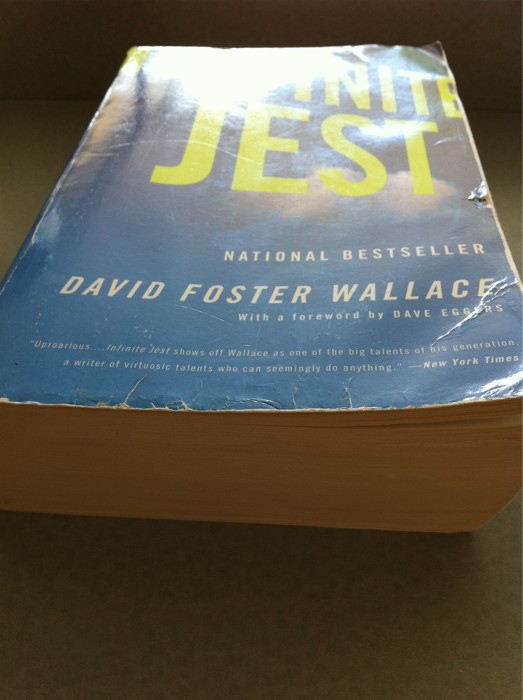It can be tempting to accept a strong job offer instead of getting into an uncomfortable salary negotiation, but you will probably leave money on the table if you do. Here’s how to negotiate your salary when the offer is already very strong.
NYC
There are 2 posts tagged NYC (this is page 1 of 1).
Should I read Infinite Jest?

 Infinite Jest is David Foster Wallace‘s best-known novel. It’s not so much something you read as a project you do, so deciding to read it is a pretty serious commitment. Not only is it just long and dense, but DFW uses footnotes as a major part of his story-telling process, so the reader spends a lot of time bouncing back and forth between the main text and the footnotes at the back of the book. I eventually began using two bookmarks – one for the main text and one for the footnotes. There are like 80 pages of footnotes, all of them in tiny font, some of them in really tiny font. Many of the footnotes have footnotes.
Infinite Jest is David Foster Wallace‘s best-known novel. It’s not so much something you read as a project you do, so deciding to read it is a pretty serious commitment. Not only is it just long and dense, but DFW uses footnotes as a major part of his story-telling process, so the reader spends a lot of time bouncing back and forth between the main text and the footnotes at the back of the book. I eventually began using two bookmarks – one for the main text and one for the footnotes. There are like 80 pages of footnotes, all of them in tiny font, some of them in really tiny font. Many of the footnotes have footnotes.
A few of my friends have asked if they should read it too. Normally, I would have an answer ready to go. I’m not shy about making recommendations or saying that something stinks. But with Infinite Jest, it’s just not that simple. So instead of saying yes or no, I’ll make a list of the cons and pros of reading it (this is spoiler-free) so each potential reader can make his own decision. Note that these are sort of dependent on one’s perspective and book preferences – some of the pros could be cons and and vice versa.
Cons
- It’s freaking huge. It’s over 1,100 pages and it took me about 10 months to finish. I’m a slow reader, and I was working on a lot of other stuff during that time, but I also spent a lot of time reading. This isn’t a book you pick up at the airport so you can read it on your five-hour flight to NYC.
- It’s not even remotely a typical novel. The story isn’t as buttoned-down as other novels and DFW often goes on and on about the minutia of various topics using multi-page paragraphs. It doesn’t have a clearly defined timeline. The characters take forever to develop.
- The subject matter isn’t always family friendly. In particular, DFW seems to have a near-encyclopedic knowledge of all things drugs, and he writes a lot about substance abuse. He also spends substantial time on other unsavory topics.
Pros
- There’s nothing else like it. It’s a story, but it’s also just a beautifully written thing.
- It’s amazing how much he knows about so many subjects. When I said “near-encyclopedic” earlier, I meant it. I’ve never read anyone else who writes about so much, so well.
- The way he writes is totally unique and captivating. He manages to be one of the more relaxed writers I’ve read while also being one of the most technical. He almost overtly scoffs at normal usage and basic rules of writing, and he totally pulls it off.
Some critics have said that Infinite Jest could’ve used more editing, but I’m not so sure. In a way, it’s sort of like DFW gave us as much as he could give. And given that he’s not around to write anymore, I think he left Infinite Jest as a pretty substantial gift to the literary world.
So, should you read it? Yes, if you’re not looking for a nice, tight story to read. Yes if you have a lot of time to invest in this sort of project. Yes, if you don’t mind reading detailed portraits of seriously messed-up people. Yes, if you want to read something unlike anything else. No, if you don’t have much time to read. No, if you want a nice, clean storyline with three acts. No, if you don’t want to have to work while you read.
But yes, you should read it.
I’d love to hear what other Infinite Jest readers think – let me know in the comments!
PS If you decide to read it, and you buy it from Amazon, I make a buck or something if you use this link. And if you were thinking about reading it and then thought, “Well, if he’s just plugging this book so I’ll buy it and he’ll make a buck, I won’t read it!” then don’t click the link and go buy it somewhere else and read it anyway.
